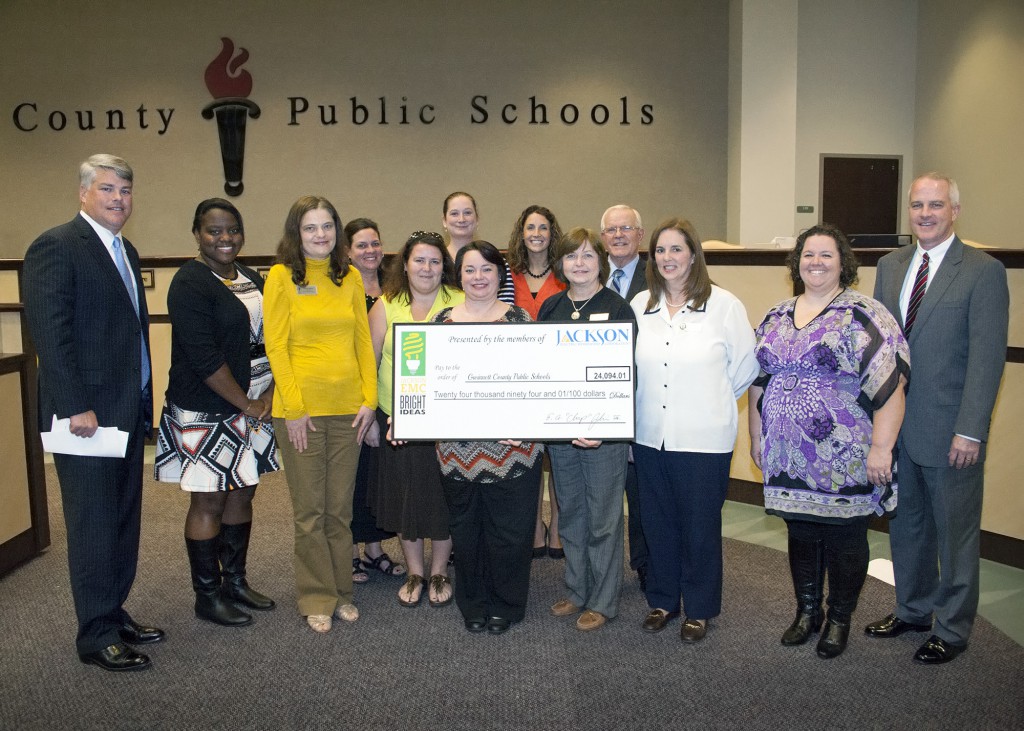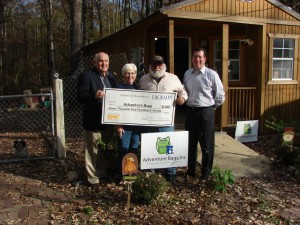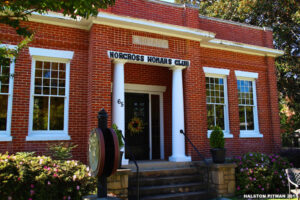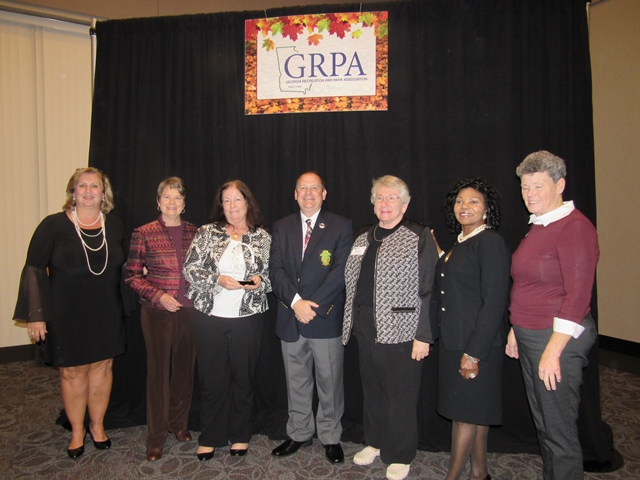
Jackson EMC has awarded $24,000 to Gwinnett Public Schools for Bright Ideas grants for teachers submitting worthy projects. Jackson EMC Senior Commercial/Industrial Representative Todd Evans (left) and Director of Commercial/Industrial Marketing Lee Chapman (far right) presented School Board with a check recognizing the grant winners for their dedication to education. From left are Evans, Jessica Mincey, Liliana Tamas, Karen Jackson, Katerina Flanders, Catherine Warnock, Michele Langhans, Lindsay Brenner, Sandra Wise, Gwinnett Public Schools CEO/Superintendent J. Alvin Wilbanks, Julie Wilkerson, Lisa Schulze and Chapman. Not pictured: Wayne Dail, Barbara Teti Davis, Dr. Jason Garner, Keri Humrighouse, Lisa Kasko and Rod Paris.
IN THIS EDITION
EDITOR’S NOTE: Because of the Thanksgiving holiday, there will be only one edition this week. The next edition will be published on December 1. –eeb
TODAY’S FOCUS: Is That a Carnegie Library Building in Norcross?
EEB PERSPECTIVE: Enterprising Young Woman Ventures Out with First Product
ANOTHER VIEW: Oh, the Joys, the Anguish, of Thanksgiving
UPCOMING: Myriad of Christmas Activities in Dacula on Sunday, December 6
NOTABLE: Eleven Middle School Teachers Win Bright Idea Grants
RECOMMENDED READ: The Generals by Winston Groom
GEORGIA TIDBIT: Once a Wonder, Kudzu Is No Longer Considered a Beneficial Crop
TODAY’S QUOTE: The Name of Your Pillow Where You Pray at Night
MYSTERY PHOTO: Tall Column Commemorates What, and Where Is It?
LAGNIAPPE: Master Gardener Volunteers Win Recognition
TODAY’S FOCUSHow Norcross got what looks like Carnegie Library, but not so
(Editor’s Note: A Gwinnettian has done research on a building approaching 100 years old…now called the Norcross Woman’s Club on North Peachtree Street. –eeb)
By Geoff Hammett
NORCROSS, Ga., Nov. 24, 2015 | It’s interesting that a Carnegie Library style building in Norcross resembles the early 1900s one-room Carnegie Library designs, but the Norcross library was built in 1921. So I investigated the possibility that the Norcross Library could be an unaccounted for Carnegie Library. Even if not funded as a Carnegie Library, the building is at least in spirit and in appearance a Carnegie Library. It eventually became the first library in Gwinnett County.
A Carnegie Library building grant to the Norcross Woman’s Club is described in the Allen Francis book Norcross (reprinted in the green Adams/Crapo Norcross book).
The book mentions that after much correspondence with Andrew Carnegie’s secretary, a grant of $5,000 was offered, but never secured, because the recipients felt the terms were too onerous. Carnegie Library funding generally required recipients to commit to raising 10 percent of the grant per year to maintain the library and provide free access to books.
The Norcross Woman’s Club initiated their library activity in response to the club’s State Federation request in 1907 to observe “Library Day.” Club members collected donations for a permanent library in Norcross including $2,500 from Edward F. Buchanan, an orphan boy raised in Norcross, who had exceptional skills in telegraphy and had become successful on Wall Street. However, Mr. Buchanan’s financial problems in 1908, and the subsequent return of his donation, in the form a loan to be paid back to the Woman’s Club with interest, held up the project.
Ten years later the loan was paid off by Mr. Buchanan’s adoptive mother’s estate yielding almost $5,000, but the encumbrance placed on the initial donation delayed the building completion until 1921.
In the book written by Abigail A. Van Slyck book, Free to All: Carnegie Libraries and American Culture, 1890-1920, the responsibility for library designs went to James Bertram, Andrew Carnegie’s personal secretary. From 1903 to 1911 Bertram reviewed every set of plans for Carnegie-financed libraries.
In 1911 Bertram documented guidance on library design in a pamphlet that included designs and floor plans. Reprinted in the book written by Theodore Jones, Carnegie Libraries Across America: a public legacy, all the floor plans in Bertram’s design guide depict one-story buildings with partially exposed basements and large windows. Each plan features a course of steps leading up to the main floor to remind entrants they are ascending steps toward knowledge. Here (attached) is the type “B” floor plan shown in the pamphlet, which presents an architectural design very consistent with the Norcross Library building.
Regarding other good references, here is a link to a summary of the Carnegie Libraries located in Georgia. Several of these Georgia buildings are listed on the National Register of Historic Places:
The Carnegie Corporation of New York may provide preservation funding, their website is www.carnegie.org. The Carnegie Correspondence Archives are located at Columbia University Rare Book and Manuscript Library. The curator of these archives would likely be interested in any Carnegie or Bertram correspondence from the Norcross Woman’s Club records, should anyone have it.
EEB PERSPECTIVEEnterprising Buford resident produces cookie kit for youngsters
By Elliott Brack, editor and publisher
NOV. 24, 2015 | A resident of Buford has launched her own business — producing a Cookie Chemistry Lab for children eight and older. It’s already in several stores, and online, all aimed at children during the Christmas season.
 The young lady, Crystal Felton, age 30, is hoping that this initial effort at selling her own product will allow her to develop new ideas….and not saying what they are, she has several in mind. She’s a budding entrepreneur, and has the confidence to become successful. Her business is named Epiphany of Chemistry, LLC.
The young lady, Crystal Felton, age 30, is hoping that this initial effort at selling her own product will allow her to develop new ideas….and not saying what they are, she has several in mind. She’s a budding entrepreneur, and has the confidence to become successful. Her business is named Epiphany of Chemistry, LLC.
The cookie lab kit is now in Toys R Us, as well as online at K-Mart, Sears and Amazon, and sells for $24.99. The kit contains an apron, recipes, spatula, measuring spoons, three cookie cutters, and three stencils to make icing designs for topping the cookies. There’s also plans for an adult version of the kit, without spatula and measuring spoons, which will sell for $22.
Crystal has 1,000 kits in stock, and can produce another 1,000 within two weeks. In her wildest dream, she hopes to sell 5,000 or more kits.
The enterprising businesswoman is a native of Athens, Tenn. and began college at Tennessee State. She eventually graduated in chemistry from the University of Tennessee, and has worked in a college lab job, and for DuPont in Lenoir, Tennessee.
After her parents died, Crystal and her sister, Shernita, now 33, moved recently to Buford to be closer to other family members. She used part of her inheritance from her family to initially fund her business venture.
Once she decided she wanted to run her own business, and figuring out what product she would create, plus after getting business counseling in Cleveland, Tenn., about four months ago, she went to the Internet for further help. There she found a patent attorney and got approval of a patent.
Then she found, Linda Parry, president of Product Launchers in New York, to help get her product in major stores. “They’ve really been of great help to me,” Crystal says.
 Ms. Parry says of Crystal: “She has a wonderful product, which makes my job easy. It’s a good concept, and there’s nothing else like it on the market. It’s also packaged beautifully, and all we had to do was to put the marketing engine behind it, to give it the lift it needed. Hers stood out. And it’s a clever way to get the children into the kitchen. ”
Ms. Parry says of Crystal: “She has a wonderful product, which makes my job easy. It’s a good concept, and there’s nothing else like it on the market. It’s also packaged beautifully, and all we had to do was to put the marketing engine behind it, to give it the lift it needed. Hers stood out. And it’s a clever way to get the children into the kitchen. ”
Then back to the Internet. “I looked online to see which firms could make components for the kit. I found a firm in Minnesota which did a good job for me on my cookie cutters, at a good price.” She came up with the overall design, then went to a graphics person to illustrate the kit.
Crystal says of her venture: “I’ve worked at the corporate level before, and feel that I am mature enough to own my business and go into this venture. I have an ability to understand chemistry, combined this with my love for food, and came up with this science kit for cookie making.”
She continues: “I’ve got other ideas of products to make and not all these ideas are aimed at the kids. This first one is building my confidence. I don’t think I’ll go into another product for at least six months. I want to see how this Chemistry Cookie Lab does first. The patent attorney told me that there was nothing like this in our country, and perhaps some day I can go with this into other countries, too.”
It’s refreshing to see a young person go about an idea with zest, confidence and intelligence. Here’s thinking that Crystal Felton will be successful with this idea.
ANOTHER VIEWMiffed as she approaches her favorite holiday, Thanksgiving
By Debra Houston
NOV. 24, 2015 | I’m miffed, and it has nothing to do with 20 people coming to my house for Thanksgiving dinner. No, I love the holiday and all that goes with it.
![]() I love dusting off old issues of Southern Living each year for inspiration on recipes, decorating, and hospitality. I hang an oversized harvest wreath in my kitchen and on the porch door. From the jungle of my basement, I dig up Puritan figurines, unearth Puritan stuffed bears, and nearly trip on a stone Puritan man grimly holding a musket; he will guard the hearth. My husband will carry up the heavy brick turkeys (use your imagination). From the top of my fridge I bring down the whittled wooden head of an Indian chief for the centerpiece on the kitchen table. The little ones always get a kick out of him.
I love dusting off old issues of Southern Living each year for inspiration on recipes, decorating, and hospitality. I hang an oversized harvest wreath in my kitchen and on the porch door. From the jungle of my basement, I dig up Puritan figurines, unearth Puritan stuffed bears, and nearly trip on a stone Puritan man grimly holding a musket; he will guard the hearth. My husband will carry up the heavy brick turkeys (use your imagination). From the top of my fridge I bring down the whittled wooden head of an Indian chief for the centerpiece on the kitchen table. The little ones always get a kick out of him.
To say I go haywire over Thanksgiving is an understatement. It comes in autumn, my favorite season, when cool dry air dips south and energizes me. And of course, the holiday makes me count my blessings.
So what has got me so miffed this year? They renamed Thanksgiving! Read on.
I drove through Old Lilburn this week and found Christmas lights draping the town. I saw a decorated Christmas tree, for goodness sake! I shopped at the supermarket to piped Christmas music. Later at home, television ads of toys and gift ideas assaulted me. I called a friend for perspective. I hoped I hadn’t interrupted her dinner. Not at all, she said, she was decorating for Christmas.
Did I fail to get the memo about skipping Thanksgiving this year? It’s almost as if the holiday is out of vogue. Shouldn’t we take at least one day to humble ourselves into gratitude?
Merchants are the culprits. Among American holidays, Thanksgiving doesn’t involve gift giving, unlike Christmas, Valentine’s Day, and Halloween. It’s a hard for merchants to link toys, jewelry, and candy to Thanksgiving. They can’t stand the idea of you sitting around and stuffing your face, not when everything is MARKED DOWN. Forget kinfolk, tradition, and — well, thanks giving. On the contrary — go shopping and bring the whole family.
Whatever you do this Thanksgiving, please remember to show gratitude for what you have and not for what you expect to buy on Black Friday Eve.
IN THE SPOTLIGHTGeorgia Campus – Philadelphia College of Osteopathic Medicine
 The public spiritedness of our sponsors allows us to bring GwinnettForum.com to you at no cost to readers. Professional healthcare programs leading to doctoral degrees in Pharmacy (PharmD) and Osteopathic Medicine (DO) are offered at Georgia Campus – Philadelphia College of Osteopathic Medicine (GA-PCOM) in Suwanee Ga. A graduate degree at the master’s level can be earned in Biomedical Sciences and Physician Assistant Studies. GA–PCOM, which is celebrating its 10 year anniversary, is a private, not-for-profit branch campus of the fully accredited Philadelphia College of Osteopathic Medicine, a multi-program institution with a 116-year tradition of educational excellence.
The public spiritedness of our sponsors allows us to bring GwinnettForum.com to you at no cost to readers. Professional healthcare programs leading to doctoral degrees in Pharmacy (PharmD) and Osteopathic Medicine (DO) are offered at Georgia Campus – Philadelphia College of Osteopathic Medicine (GA-PCOM) in Suwanee Ga. A graduate degree at the master’s level can be earned in Biomedical Sciences and Physician Assistant Studies. GA–PCOM, which is celebrating its 10 year anniversary, is a private, not-for-profit branch campus of the fully accredited Philadelphia College of Osteopathic Medicine, a multi-program institution with a 116-year tradition of educational excellence.
- To learn more about how GA-PCOM is educating tomorrow’s healthcare leaders, come to an open house on Friday, December 11 from 5:30 p.m. to 8 p.m., visit www.pcom.edu or call 678-225-7500.
- For an appointment at the Georgia Osteopathic Care Center, an osteopathic manipulative medicine clinic which is open to the public, call 678-225-7489.
- For a list of other sponsors of this forum, go to: Our sponsors.
Send us your thoughts
We encourage readers to submit feedback (or letters to the editor). Send your thoughts to the editor at elliott@brack.net. We will edit for length and clarity.
Make sure to include your name and the city where you live. Submission of a comment grants permission for us to reprint. Please keep your comments to 300 words or less. However, we will consider longer articles (no more than 500 words) for featuring in Today’s Issue as space allows.
- SEND FEEDBACK AND LETTERS: elliott@brack.net
Host of activities at Christmas in Dacula on Dec. 6
This year’s Christmas in Dacula will be held on December 6 from 3-8 p.m. and hosted by Hebron Church on the corner of Fence and Dacula Roads. Presented by the Dacula Business Association and the City of Dacula, Christmas in Dacula drew more than 8,000 attendees last year and collected more than 2,000 pounds of food for local food banks and community groups.
Christian Jolly, executive director of Christmas in Dacula, says: “It’s been an exciting year as our board has worked together to expand on the success of last year’s inaugural festival. This is the community’s Christmas celebration. We hope to have another amazing turnout and look forward to once again helping our community through the food pantry donations and ministries of our benefiting organizations.”
Highlights for this year include:
 Santa’s Village with activities for children and teens;
Santa’s Village with activities for children and teens;- More than 60 business and craft vendors;
- Santa Claus and other characters meet-and-greet;
- Tallest community Christmas tree in Gwinnett County;
- *Live music from local schools and performing artists;
- Food truck row; and
- Live nativity presented by Prospect United Methodist Church.
New for this year is the Christmas in Dacula Jingle Jog 5K and Fun Run. The 5K starts at 2 p.m. and is followed by the fun run at 3 p.m. Awards for top runners in all age groups will be presented on the main stage during the big event.
While the event is free, everyone is asked to bring a non-perishable food item to help re-stock local food pantries during this critical time. Additionally, all proceeds from the event go towards local ministries helping those in need.
Dacula Mayor Jimmy Wilbanks says: “As the year comes to a close, let’s all take the time to celebrate the blessings of life. Take the opportunity to visit with your neighbors, colleagues, friends and family at Christmas in Dacula. I look forward to attending, celebrating the joy of the Christmas season, and having a very Merry Christmas with each of you.” For more information, visit www.christmasindacula.org.
McDaniel Farm offers candlelight tours beginning Saturday
The Environmental and Heritage Center (EHC) invites you to escape the hustle and bustle of the modern holiday season and return to a more tranquil time when a brightly lit home full of family and neighbors made for a warm and festive winter’s night.
 There will be candlelight tours of McDaniel Farm beginning the Saturday after Thanksgiving and running throughout the month of December. Step back in time as costumed guides share historic customs and traditions from the Victorian period and provide guests with a glimpse of everyday life on a family farm.
There will be candlelight tours of McDaniel Farm beginning the Saturday after Thanksgiving and running throughout the month of December. Step back in time as costumed guides share historic customs and traditions from the Victorian period and provide guests with a glimpse of everyday life on a family farm.
“This is a great opportunity to see McDaniel Farm from a different perspective,” said Jason West, EHC’s director of programming. “The farm will be aglow with the warmth of candles and will be decorated with fresh greenery and period holiday ornaments.”
Guests will be treated to a delicious cup of hot chocolate or apple cider as well as have the opportunity to make a holiday craft. Sunday evening tours will feature special holiday musicians. Groups scheduled to appear include the Mill Creek High School String Quartet, Britches Full of Stitches, an Appalachian Celtic Consort and Dave and Phoebe Clark, a father/daughter musical duet.
The one and a half hour guided candlelight tour will be offered on various dates and times starting on November 28. Tours offered Monday through Friday will begin at 7p.m. Saturday and Sunday feature two tour start times – 6 p.m. and 7p.m. In addition to the November dates, tours will be offered on Dec 3, 4, 6, 10, 11, 12, 13, 17, 18, 19, 20 and 21.
The program fee for the candlelight tour is $8 per person for the weekday and Saturday tours. The program fee is $10 for the special Sunday holiday tours. EHC members are free. Pre-registration is required and can be done online at www.gwinnettEHC.org. McDaniel Farm is located at 3251 McDaniel Road, Duluth.
NOTABLEBright Ideas grants come to 11 Gwinnett middle school teachers
Eleven Gwinnett County Middle School teachers have won a total of $24,094 in Bright Ideas grants from Jackson Electric Membership Corporation (JEMC). In the first year of the program, JEMC is awarding 36 local teachers from 24 schools with $50,608.31 in educational grants. These grants are funded through unclaimed capital credits.
 Gwinnett County grant winners and their schools are:
Gwinnett County grant winners and their schools are:
- Lisa Schulze, Creekland, $1,974 for Digging into Prehistoric Past;
- Liliana Tamas, Dacula, $2,000 for Math Remediation with MobyMax Tablets;
- Keri Humrighouse, Frank Osborne, $1,145 for MagLev Project Vehicle;
- Dr. Jason Garner, Hull, $640 Electricity and Magnetism – Powering Homes;
- Barbara Teti Davis, Jones, $2,000 for Living Under the Sea;
- Lindsay Brenner, Lanier, $2,000 for Tower Garden – Vertical Growing System;
- Katerina Flanders, Lanier, $1,245.16 for McGregor’s Gardening and Sustainability;
- Michele Langhans, Lanier, $2,000 for Using Robotics in STEM Environments;
- Rod Parris, Lanier, $328.85 for Using Greatest Common Factor and Least Common Multiple;
- Catherine Warnock, Lanier, $1,799.82 for Teaching Social and Life Skills;
- Karen Jackson, Northbrook, $1,424 for Problem Solving in Science;
- Lisa Kasko, Pinckneyville, $1,298.50 for Game On! : Let’s Roll;
- Wayne Dail, Radloff, $1,887 for Solar Energy Inquiry and Application;
- Julie Wilkerson, Radloff, $1,283.68 for Renewable Energy with K’Nex;
- Jessica Mincey, Sweetwater, $1,374 for World News in the Classroom; and
- Sandra Wise, Twin Rivers, $1,694 for Makerspaces CCT (Creative & Critical Think Tank).
 Through the Bright Ideas program, educators can earn up to $2,000 each for innovative classroom projects that would otherwise go unfunded. This program provides funds to state- certified educators in public middle schools in Jackson EMC’s service area.
Through the Bright Ideas program, educators can earn up to $2,000 each for innovative classroom projects that would otherwise go unfunded. This program provides funds to state- certified educators in public middle schools in Jackson EMC’s service area.
Chip Jakins, Jackson EMC president and CEO says: “We know budgets can hinder classroom projects and that educators dip into their own pockets to help pay for their creative lesson plans. We think this program will energize the level of teaching, learning and the overall educational experience.”
A panel of outside judges evaluated the blind applications for innovation, implementation, objectives, student involvement, goals and budget. Learn more about Bright Ideas and other youth programs at www.jacksonemc.com/brightideas.
Group recognizes Unterman on Strengthening Families Act
Sen. Renee Unterman (R–Buford) was honored Thursday with the 2015 Champion of Children Award from the Foundation for Government Accountability (FGA). The Foundation highlighted Sen. Unterman’s work on Senate Bill 3, also known as the Supporting and Strengthening Families Act. The foundation cited her for “….from the beginning no one worked harder than Senator Unterman on providing a safety net for the children of Georgia. Her work on The Supporting and Strengthening Families Act will have an impact on the wellbeing of Georgia’s children for decades to come.” Senate Bill 3 provides an alternative for parents who must temporarily waive parental rights due to circumstances such as military service or substance abuse treatment. The bill also clearly defines the form necessary for executing a written power of attorney for the care of a child.
Walton EMC returning $10.2 million in credits to its customers
Walton Electric Membership Corporation (EMC) is returning $10.2 million to its 120,500 customer-owners this December, making the 2015 capital credit refund the largest in the cooperative’s 79-year history.
 The cooperative’s board of directors recently voted to return $10,236,000 in capital credits, a $5 million increase from 2014. Approximately 120,500 customer-owners who had accounts in 1988, 1989 and/or 2013 are included. That means more than 95 percent of current customer-owners will get a refund.
The cooperative’s board of directors recently voted to return $10,236,000 in capital credits, a $5 million increase from 2014. Approximately 120,500 customer-owners who had accounts in 1988, 1989 and/or 2013 are included. That means more than 95 percent of current customer-owners will get a refund.
CEO Ronnie Lee says: “Walton EMC is a cooperative, owned by the same people who receive its services. Showing a profit is self-defeating and is why we return leftover revenues. The individual amount returned to customer-owners is based on their electric bills, or, in other words, the amount of business they did with their company.”
After paying off debt and establishing a reserve for unexpected events (like a catastrophic ice storm), the board determines if it’s financially prudent to issue a refund. If so, most refunds are distributed by a credit on electric bills. This saves the cooperative and its customer-owners tens of thousands of dollars in check printing and postage costs.
Walton EMC provides electric service to 124,000 residential and business accounts in a 10-county area between Atlanta and Athens. Because its customers own the company, service — not profit — is Walton EMC’s primary focus.
RECOMMENDEDThe Generals
History by Winston Groom
 Just published is a book of the lives of three key generals in World War II, which are highlighted by Forrest Gump author Winston Groom, a distinguished historian. The generals are George Marshall, George Patton and Douglas MacArthur. Groom explores how these three leaders’ lives are intertwined even before the war, as they experienced World War I, then came the period between the wars, when promotions were sometimes difficult and often life became tedious and boring to these three, who each desperately wanted to be a leader in military service. The book brings out new details in each of these lives, and beautifully condenses the fighting in World War II. Those interested in military history, and particularly in these fighting generals, will love this book. Mr. Groom spoke recently in Norcross, and was delightful, brought to Gwinnett by its public library. The full title of the book is The Generals: Patton, MacArthur, Marshall, and the Winning of World War II. — eeb
Just published is a book of the lives of three key generals in World War II, which are highlighted by Forrest Gump author Winston Groom, a distinguished historian. The generals are George Marshall, George Patton and Douglas MacArthur. Groom explores how these three leaders’ lives are intertwined even before the war, as they experienced World War I, then came the period between the wars, when promotions were sometimes difficult and often life became tedious and boring to these three, who each desperately wanted to be a leader in military service. The book brings out new details in each of these lives, and beautifully condenses the fighting in World War II. Those interested in military history, and particularly in these fighting generals, will love this book. Mr. Groom spoke recently in Norcross, and was delightful, brought to Gwinnett by its public library. The full title of the book is The Generals: Patton, MacArthur, Marshall, and the Winning of World War II. — eeb
An invitation: what books, restaurants, movies or web sites have you enjoyed recently? Send us your recent selection, along with a short paragraph (100 words) as to why you liked this, plus what you plan to visit or read next. –eeb
GEORGIA ENCYCLOPEDIA TIDBITOnce a wonder crop, kudzu now a weed … but with many stories
Kudzu (Pueraria lobata; formerly P. thunbergiana) is a prolific weedy vine and botanical newcomer that has covered millions of acres in Georgia and the Southeast. It has also made its way into southern folklore and culture.
Cultivated in Japan for centuries, kudzu first appeared in the United States in 1876 at the Philadelphia Centennial Exposition’s Japanese Pavilion. It was introduced to southerners at the New Orleans (Louisiana) Exposition in 1884-86. Because of its luxuriant and rapid growth, broad and layered leaves, and wisteria-like purple or magenta flowers, it soon gained popularity as a shade plant and became known as the “porch vine.”
 By the early 1930s some agricultural experts had come to believe in the virtues of protein-rich kudzu as a forage plant that could be grown on poor soils and began to advocate its production to farmers.
By the early 1930s some agricultural experts had come to believe in the virtues of protein-rich kudzu as a forage plant that could be grown on poor soils and began to advocate its production to farmers.
In 1930-31, during the Great Depression, Georgia experienced the worst drought in its history. The condition of the state’s soil, already depleted by poor agricultural practices, worsened. In 1935 the newly formed Soil Conservation Service decided to tout kudzu for erosion control and began producing seedlings in Soil Conservation Service nurseries in Virginia, North Carolina, Alabama, and Georgia. The number of acres given over to the plant grew rapidly in these states. Between 1935 and 1942 Soil Conservation Service nurseries grew a hundred million kudzu seedlings. They were shipped throughout the Southeast and distributed to farmers, who used the vine on rilled and gullied croplands, and to railroads and highway departments that planted the seedlings along exposed rights-of-way.
By the mid-1940s kudzu had gained other champions. Channing Cope, a columnist for the Atlanta Constitution, grew kudzu for forage on his Yellow River farm southeast of Atlanta. Cope organized the Kudzu Club of America, whose members planted the vine wherever they could. Both the Soil Conservation Service and the Kudzu Club were wildly successful. By 1945 about a half million acres in the South were planted in kudzu.
But the virtue that the vine’s promoters praised most highly, its vigor and rapid rate of growth, soon revealed itself a virtue in excess. By the 1950s foresters and highway engineers were complaining that wherever it was planted, the vine grew upward or outward—at the rate of 60 to 100 feet a season.
It engulfed and smothered pine trees, and established dense mats several feet thick along the sunny sides of roads. Both farmers and urban gardeners living adjacent to naturalized banks or empty lots cursed the vine’s invasiveness. The U.S. Department of Agriculture removed kudzu from its list of acceptable cover crops for its Agricultural Conservation Program in the 1950s, and in 1972 it demoted the plant to weed status. By 1993 a study by the Congressional Office of Technology Assessment claimed that kudzu accounted for about $50 million annually in lost farm and timber production.
In the meantime the “plant that ate the South” has made its way into southern folklore and humor. “If you’re going to plant kudzu, drop it and run,” or “Plant it at night so that your neighbors don’t see you,” goes the lore. Visitors are told about hitchhikers on kudzu-lined country roads who have disappeared without a trace. They are advised to keep their car windows up while driving down the same roads, lest the rapidly growing vine reach in and grab the wheel.
Some southerners have taken this prolific “hee-haw” and dressed it up chic: In Atlanta representations of kudzu have graced brown-paper shopping bags from the upscale shopping mall Lenox Square and provided the motif for the former Kudzu Kafe, a high-end, home-cooking restaurant in Buckhead. Poets (most notably, James Dickey, in Kudzu) and novelists have also embraced the plant and imagined it a primal force of the South. For many, kudzu has become an invasive weed, but the culture of the region is all the richer for it.
- To access the Georgia Encyclopedia online, go to http://www.georgiaencyclopedia.org
Several thought this croquet match was in Newport, R.I.
This tall column celebrates something. Can you figure out what it is, and where this photo was taken? Send your answers to elliott@brack.net and be sure to include the town where you live.
 Susan Northcuff of Lawrenceville was excited to be the first person recognizing last edition’s Mystery Photo. “I think I’ve got this one!! It’s the Croquet Lawn at the Ocean House luxury hotel, 1 Bluff Ave, Watch Hill, Westerly, RI!!!” She was right.
Susan Northcuff of Lawrenceville was excited to be the first person recognizing last edition’s Mystery Photo. “I think I’ve got this one!! It’s the Croquet Lawn at the Ocean House luxury hotel, 1 Bluff Ave, Watch Hill, Westerly, RI!!!” She was right.
Several people thought it was in Newport, R.I. Susan McBrayer of Sugar Hill, who submitted the photo, says: “Definitely not Newport. Maybe because Rhode Island is such a small place, some people think of every place along the coast of R.I. as Newport. But, Westerly is more than one hour south/west of Newport. The hotel is in the “village” of Watch Hill, which is in the town of Westerly.”
Ruthy Lachman Paul told us “The original Ocean House was a post-Civil War resort destination for the rich. The 1916 silent movie American Aristocracy was filmed at the towering Victorian hotel, known for its yellow facade and striking ocean views.”
LAGNIAPPEGwinnett Master Gardeners win volunteer award from state group
Gwinnett County Master Gardeners Association (GCMGA) received the Volunteer award from the Georgia Recreation and Park Association (GRPA) during the group’s annual conference held in Dalton. The gardeners received the award for working with GRPA since 1999, averaging 1000 hours per year. receiving the honor award. From left receiving the GRPA Volunteer award are Tina Fleming, GCPR division director; Mary Ann Maher and Kathy Parent with GCMGA; Michael Brantley, GRPA president; Joyce Teel and Shirley Bohm with GCMGA; and Kim Shealy, GCPR Volunteer Resources Coordinator. Master Gardeners have revitalized wildlife areas, re-established a Brook garden and regularly served as stewards of the environment by utilizing native plants and best environmental practices. Volunteers serve as ambassadors to the public of Gwinnett County on horticultural practices that foster beautiful gardens and healthy environments.
CREDITSGwinnettForum is provided to you at no charge every Tuesday and Friday. If you would like to serve as an underwriter, click here to learn more.
- Send your thoughts, 55-word short stories, pet peeves or comments on any issue to Gwinnett Forum for future publication.
- MORE: Contact Editor and Publisher Elliott Brack at: elliott@gwinnettforum.com
















Follow Us